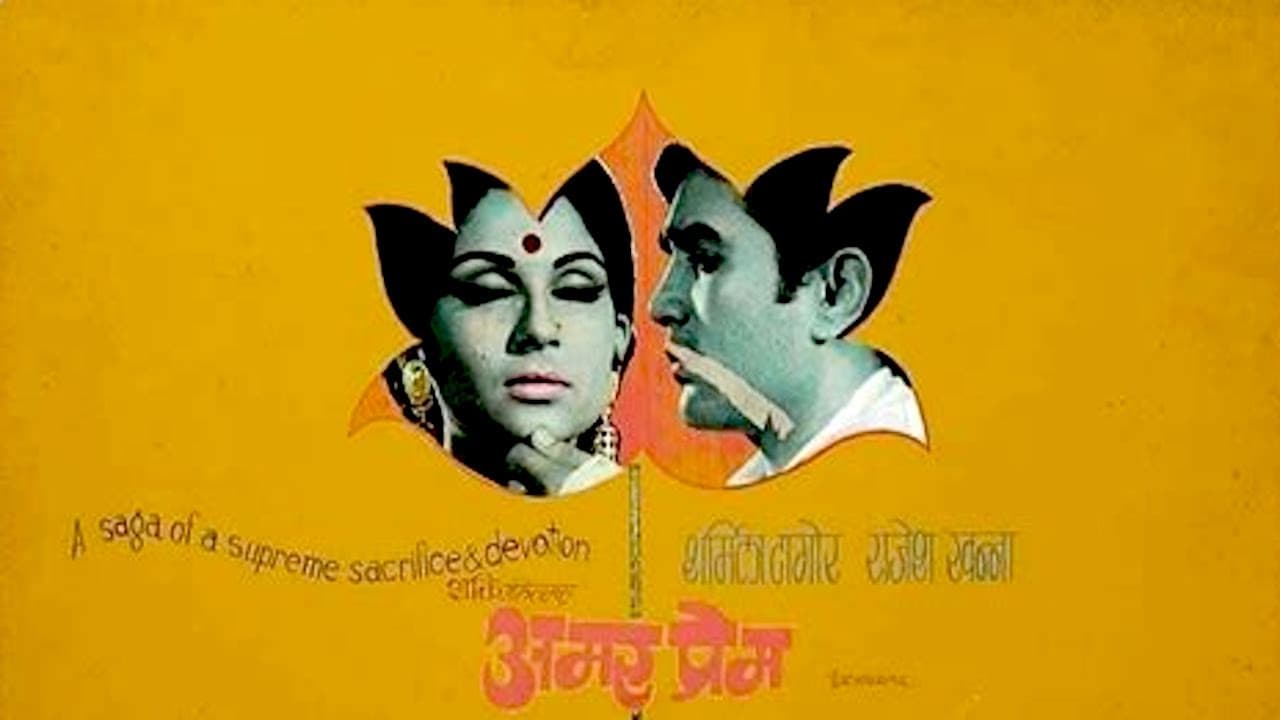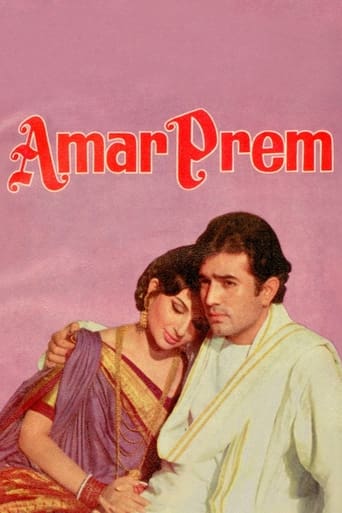

Heartwarming is a word which would best describe Shakti Samanta's Amar Prem. The film is about love, humanity, compassion, and how all these terms are condemned by the cruel society of those times. This is the story of Pushpa, a young woman who runs away from her husband's house after the latter marries again and starts abusing her. She is later brought to a brothel in Calcutta by her village-uncle. There she starts singing while all the passers-by walk and get enchanted by her voice. That's her new job, and there she meets Mr Anand, a young bitter and unhappily married man whose wife does not even care about. Another man from the same village she comes from named Sharma resides close to Pushpa's house. There she meets the little boy Nandu, Sharma's son from his first deceased wife, who is maltreated by his stepmother while his father is at work. A great relationship grows between Pushapa and Anand, and even a greater mother-son relationship grows between Pushapa and Nandu. But the cruel society won't leave it at that.Amar Prem is a melodramatic movie, but it is a beautiful and sincere melodrama, not a clichéd one. The relationships in this movie are superbly portrayed, my favourite relationship being the one between Pushapa and Nandu. Samanta uses symbolism to illustrate the story. The film is good in writing, dialogues, music and acting. RD Burman's music never disappoints. Where acting goes, this is Sharmila Tagore's movie and she kind of reprises her role in Aradhana, that of a selfless and caring woman, who epitomises Indian feminine beauty. She is indeed beautiful and convincing throughout the movie. Rajesh Khanna is excellent as Anand and does particularly well in the film's final sequences. The child actor who plays Nandu is wonderful. Vinod Mehra does very well as the older Nandu. Amar Prem is a worthy film. It is both moving and enjoyable, and should be a real cinematic treat for lovers of classic Hindi cinema.
... View MoreThis movie has showed me what is true love. It reminds me of an essay by Krishanmurthy how love is not jealousy, not possession or control over each other not just companionship. Rajesh Khanna and Sharmila Tagore had unconditional love. Movie is free of love among blood relationships.Movie scores century in every area weather it is acting, script, direction or music. Songs in movie not just entertains us but take movie to a new height. Both Rajesh and Sharmila has done a great job.After Anand this is Rajesh Khanna's best acting at the end of movie i had tears in my eyes.
... View MoreThis movie is a re make of an old Bengali classic starring Uttam Kumar. The role of Uttam Kumar has been played by Rajesh Khanna in this Shakti Samanta movie. However, the performance of Super Star Rajesh Khanna, Sharmila Tagore and the music of Rahul Dev Burman are a life a time effort and they have created magic in this movie. Other characters also do their part well- Omprakash, Leela Mishra,Sujit Kumar, Vinod Mehra and others have done their part well. The movie will be remembered for its 6 nos- 3 by Kishore Kumar, 2 by Lata and 1 by S D Burman. The story is a classic and the movie deserves more than what share it has got in last 38 years and is a timeless classic and is life time effort of all the cast and crew. Dialogue of the movie "Pushpa I hate tears' is immortal. A must see to see how the magic of Rajesh Khanna, Kishore Kumar and Rahul Dev Burman worked in the early 1970s to be later spoiled by Amitabh Bachchan and his trend of action movies. It is true people forget good things like Amar Prem and remember all the bad things. A must see and a tear jerker.
... View MoreI don't claim to be an expert in Bengali literature (far from it), but I have always found stories coming out of Bengal to be a class apart. The characterization, the depth of the plot, the sincerity of the human emotion in those stories are the among the finest to be found anywhere. Kabuliwala is another such great movie to be based on a Bengali story.Sharmila Tagore is superb, Vinod Mehra plays the grown up Nandu with great sincerity. Rajesh Khanna lends a lot of credibility to Anand-babu despite having turned a major superstar during the making of this movie. Om Prakash is always a pleasure to watch although his role is very small. R.D.Burman and Kishore Kumar top it all off with the great music!
... View More